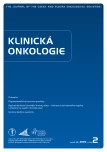-
Medical journals
- Career
Gorlin-Goltz syndrome
Authors: V. Bartoš 1; M. Kullová 2; K. Adamicová 3; I. Paučinová 4
Authors‘ workplace: Oddelenie patologickej anatómie, FNsP Žilina 1; Dermatovenerologický stacionár, FNsP Žilina 2; Ústav patologickej anatómie, JLF UK a UN Martin 3; Oddelenie lekárskej genetiky, FNsP Žilina 4
Published in: Klin Onkol 2019; 32(2): 124-128
Category: Case Report
doi: https://doi.org/10.14735/amko2019124Overview
Background:
Gorlin-Goltz syndrome is an autosomal dominant inherited disorder characterized by a predisposition to various cancers. Clinicopathological findings of syndrome are very diverse and many symptoms begin to manifest in a certain period of life.
Case:
The authors describe a case report of a man who, at the age of 34 years, presented to a dermatologist with multiple tumor lesions of the skin. The lesions started to develop when he was 30 years old and thereafter increased in number. Histology revealed superficial, superficial-nodular and nodular basal cell carcinomas. A total of 11 basal cell carcinomas were surgically removed and microscopically investigated. The others were treated locally with imiquimod cream and cryotherapy. In addition, he was found to have multiple odontogenic keratocysts in the jaw and mandible, as well as supernumerary and retinated teeth. Stomatologic and maxillofacial surgery interventions were performed. Further clinical and imaging examinations confirmed macrocephaly, hypertelorism, calcification of falx cerebri, and abnormalities of the cervical vertebrae. The spectrum of pathological findings met the diagnostic criteria of Gorlin-Goltz syndrome.
Conclusion:
Although Gorlin-Goltz syndrome is very rare in routine practice, it usually represents a serious disease with multiple organ system involvement. From a prognostic point of view, early diagnosis with adequate therapy is critical. If a diagnosis is confirmed, lifetime dispensary care with interdisciplinary medical cooperation is necessary.
The authors would like to thank all physicians who participated in the diagnostics and therapy of the presented patient.
The authors declare they have no potential confl icts of interest concerning drugs, products, or services used in the study.
The Editorial Board declares that the manuscript met the ICMJE recommendation for biomedical papers.
Submitted: 30. 8. 2018
Accepted: 8. 1. 2019
Keywords:
Gorlin-Goltz syndrome – basal cell carcinoma – odontogenic cysts
Sources
1. Krutílková V. Genetické syndromy predisponující k dětským nádorům centrálního nervového systému. Klin Onkol 2016; 29 (Suppl 1): S71–S77. doi: 10.14735/amko2016S71.
2. Plevová P, Krutílková V, Puchmajerová A et al. Gorlinův syndrom. Klin Onkol 2009; 22 (Suppl 1): S34–S35.
3. Plevová P, Šilhánová E, Foretová L et al. Vzácné hereditární syndromy s vyšším rizikem vzniku nádorů. Klin Onkol 2006; 19 (Suppl 1): S68–S75.
4. Gorlin RJ, Goltz RW. Multiple nevoid basal-cell epithelioma, jaw cysts and bifid rib. A syndrome. N Eng J Med 1960; 262 : 908–912. doi: 10.1056/NEJM196005052621803.
5. Kimonis VE, Goldstein AM, Pastakia B et al. Clinical manifestations in 105 persons with nevoid basal cell carcinoma syndrome. Am J Med Genet 1997; 69 (3): 299–308.
6. Thomas N, Vinod SV, George A et al. Gorlin–Goltz syndrome: an often missed diagnosis. Ann Maxillofac Surg 2016; 6 (1): 120–124. doi: 10.4103/ 2231-0746.186148.
7. Visioli F, Martins CA, Heitz C et al. Is nevoid basal cell carcinoma syndrome really so rare? Proposal for an investigative protocol based on a case series. J Oral Maxillofacial Surg 2010; 68 (4): 903–908. doi: 10.1016/j.joms.2009.03.032.
8. Endo M, Fujii K, Sugita K et al. Nationwide survey of nevoid basal cell carcinoma syndrome in Japan revealing the low frequency of basal cell carcinoma. Am J Med Genet A 2012; 158A (2): 351–357. doi: 10.1002/ajmg.a.34421.
9. Shanley S, Ratcliffe J, Hockey A et al. Nevoid basal cell carcinoma syndrome: review of 118 affected individuals. Am J Med Genet 1994; 50 (3): 282–290. doi: 10.1002/ajmg.1320500312.
10. Evans DG, Howard E, Giblin C et al. Birth incidence and prevalence of tumor-prone syndromes: estimates from a UK family genetic service. Am J Med Genet A 2010; 152A (2): 327–332. doi: 10.1002/ajmg.a.33139.
Labels
Paediatric clinical oncology Surgery Clinical oncology
Article was published inClinical Oncology

2019 Issue 2-
All articles in this issue
- Therapy of Relapsed/Refractory Acute Lymphoblastic Leukemia Today and Tomorrow
- Oligometastatic Prostate Cancer
- Chromothripsis – Extensive Chromosomal Rearrangements and Their Significance in Cancer
- Gastrointestinal Stromal Tumours of the Rectum – Evaluating the National Registry Data with Respect to its Use in Clinical Practice
- Gorlin-Goltz syndrome
- IgG4 Sclerosing Cholangitis – an Inflammation Imitating Tumour of the Pancreas and Biliary Tract
- High Level of Circulating Microparticles in Patients with BCR/ABL Negative Myeloproliferative Neoplasm – a Pilot Study
- Clinical Management and Outcome in Extreme Retroperitoneal Growing Teratoma Syndrome of Testicular Origin – Clinical Management and Effect of the Treatment
- Hepatic Injury Induced by a Single Dose of Nivolumab – a Case Report and Literature Review
- Leptomeningeal Metastasis in a Breast Cancer Treated with Two Lines of Intrathecal Chemotherapy – a Case Report
- The International Classification of Diseases for Oncology Integrated with the Melanoma Histogenetic Model
- Tailoring Nutritional Interventions with Molecular Pathophysiology of Cancer Cachexia – a Possible Solution to an Old Problem
- Clinical Oncology
- Journal archive
- Current issue
- Online only
- About the journal
Most read in this issue- Chromothripsis – Extensive Chromosomal Rearrangements and Their Significance in Cancer
- Gorlin-Goltz syndrome
- Oligometastatic Prostate Cancer
- Hepatic Injury Induced by a Single Dose of Nivolumab – a Case Report and Literature Review
Login#ADS_BOTTOM_SCRIPTS#Forgotten passwordEnter the email address that you registered with. We will send you instructions on how to set a new password.
- Career

